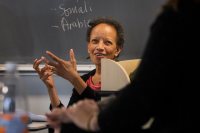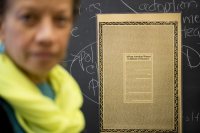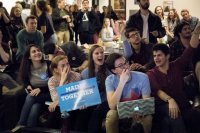
Students to conduct mock Senate hearing on Middle East
Students of a Bates politics class promise an intense 90 minutes as they conduct Hearings on U.S. Foreign Policy in the Middle East, a mock Senate hearing at 2:45 p.m. Friday, March 30, in Room G52, Pettengill Hall, during the Mount David Summit.
The students will assume the thinking of members of Congress and Bush administration officials, who will be interrogated on U.S. policies concerning Afghanistan, Iran, Iraq, Israel and the Occupied Territories. The hearing is free and open to the public. (Main story continues below.)
Nick Mazuroski ’09 attended the mock hearing. Here’s his summary:
During Bates’ seventh annual Mount David Summit, on March 30, members of Professor Eric Hooglund’s 200-level politics course “U.S. Foreign Policy in Middle East” conducted a mock U.S. Senate policy hearing. Thirteen students posed as senators representing different viewpoints on issues being faced in Iraq, Afghanistan, Israel, Palestine, Syria, Lebanon and Iran.
In addition to the 13 senators, 18 other students participated as outside witnesses or administration officials from the departments of Defense or State. The hearing sparked interesting debates and much dialogue on important issues facing policymakers today.
First on the agenda was Iraq, where “Senator” Tara Higgins ’09 began discussing the recent troop surge and the debate over additional funding for the military. Higgins attempted to persuade her colleagues that it would be important for the U.S. to diminish its presence in the country, and that additional troops and funding would only delay the stabilization process.
In contrast, “General” Sam Cutler ’09 recognized her beliefs and the current legislation to cut funding as a “sign of defeat,” stating that recent evidence regarding the surge has proven that it is working and must continue.
Other Iraq-related topics that were debated revolved around timetables for withdrawal, human rights issues and whether Iraq should be regionalized or kept as a unified nation.
Once finished with Iraq, the hearing moved to Afghanistan. The main topics of debate included the Taliban’s resurgence, reconstruction aid and security in light of the presence of Al Qaeda in the Pakistan border regions. Senators Mike Dwyer ’09 and Joe Brown focused their discussion on the country’s opium poppy problem, agreeing that it is financing the Taliban’s resurgence in the country. Afghanistan’s poppy crops are said to provide 97 percent of the world’s heroin, and thus prompted officials to look at eradication methods and the subsidizing of other crops.
The other Afghanistan issue was the distribution of reconstruction aid. Many senators and other officials disagreed with the current administration’s claim that aid is significantly boosting the economy, citing numerous sources stating that, in reality, most of it is being pocketed by corrupt officials in the Afghan government. After a disagreement between Sen. Brown and “General” Curtis Marshall ’07 on the state of Al Qaeda and funding for the military, in which Sen. Brown questioned the need for and use of additional funding, the hearing took up the conflicts in Israel, Palestine, Syria and Lebanon.
Here, the debate looked at the Bush administration “Road Map for Peace,” Hamas, human rights, Hezbollah and the legitimacy of the new Palestinian government. Sen. Jake Hardy ’07 and administration official Sam Pelletier ’07 discussed the state of Lebanon and its relationship with Hezbollah. Pelletier described Hezbollah as a “plague to the country,” and called for Syria and Iran to stop supporting the terrorist organization.
Outside witness Nicole Svirsky ’09 also commented on how the U.S. occupation of Iraq has undermined its influence elsewhere in the Middle East and called for the administration to take a larger role in other conflicts in the region, specifically the Israeli-Palestinian conflict.
The hearing concluded with the most recent controversies with Iran. Senators Rachel Kaplan ’09, Catherine Ickis ’07, Lars-Erik Olofsson ’07 and Peter Granquist ’07 discussed with administration officials the role of Iran with Iraq and its nuclear energy program.
Pressed for time, these officials diligently worked to get their points across and audience members who stayed through the entire hearing were fortunate, if not startled, to witness Granquist’s charismatic speech regarding the current administration’s view on Iran. He drew parallels between the situation in Iran and the past situation leading up to the war in Iraq, and urged the administration and others to avoid at all costs another war or even any kind of military action.
The hearing was an interesting presentation of the different political viewpoints that dominate American politics today in regard to the Middle East. Thought-provoking performances from all participants brought to light many issues that currently are, or should be, under discussion in Congress.
(Main story resumes:)
“President Bush’s disregard of the suggestions made by the Hamilton-Baker Report and request for an additional 21,500 troops just a few weeks later, with 8,200 troops three months after that, shows the divide among the political elite within the United States,” says sophomore Julia Merriman of Villanova, Pa., a student in the class. “Can these troops really stop the ethnic conflict and descent into civil war in Iraq? Bates senators will call on expert witnesses from non-governmental organizations to address humanitarian aspects of the war, including the two million Iraqi refugees who have fled to Syria and Jordan. Neoconservative viewpoints will be represented with officials testifying against what they see as the inadequate military power for controlling insurgency.”
The mock hearing is being conducted by members of Politics 253, a class studying U.S. foreign policy in the Middle East. Taught by Visiting Professor of Politics Eric Hooglund, an Iran expert, the course explores the ideological underpinnings of major U.S. policy issues such as the peace process between Israel and the Palestinians; war in Iraq; containment of Iran; globalization, especially as it affects Middle East energy resources; and the war on terrorism. The course aims to understand the role of ideological perspectives in shaping U.S. policy, the impact of that policy on the Middle East, and the “blowback” effect on the United States.
Another student in the class, senior Joanie Meharry of Stamford, Conn., says that “Students in Politics 253 will be asking penetrative questions that will hopefully provide answers to curious members of the student body, answers that many politicians are not willing to answer as the presidential campaign for 2008 heats up.”




